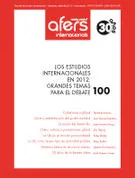The EU and the emergence of a post-Western world: in search of lost prestige

The influence of the EU in international institutions has diminished. This observation is somewhat paradoxical if we bear in mind that the entry into force of the Lisbon Treaty has given the EU greater authority to act internationally (instruments, institutions, representation). It has given the Union a “single voice”. This article examines the paradox that the EU is currently experiencing; that is, the greater its internal coherence, the less external influence it has. Through three case studies, the article argues that in order to explain the EU’s influence on international institutions we must go beyond an analysis of its single voice (an element that is necessary, but not sufficient, and can even be counter-productive) and take into consideration the change in the power structure and the regulatory rejection from which the EU is suffering, in a world that is increasingly pro-sovereignty and less Western-centric.
Key words: European Union, international institutions, world order, international power structure, regulatory rejection.
The full text articles of this issue are available only in Spanish language.